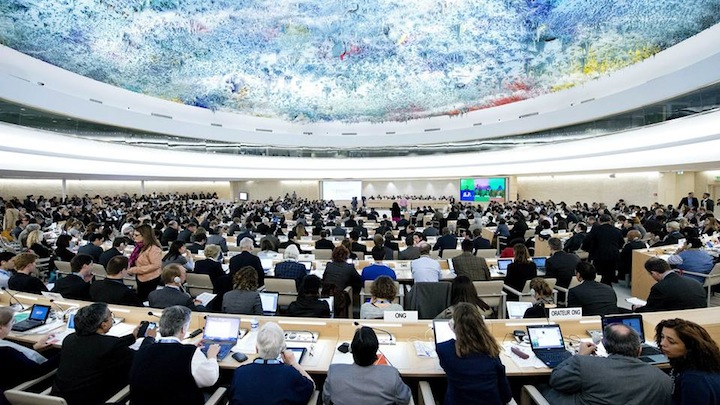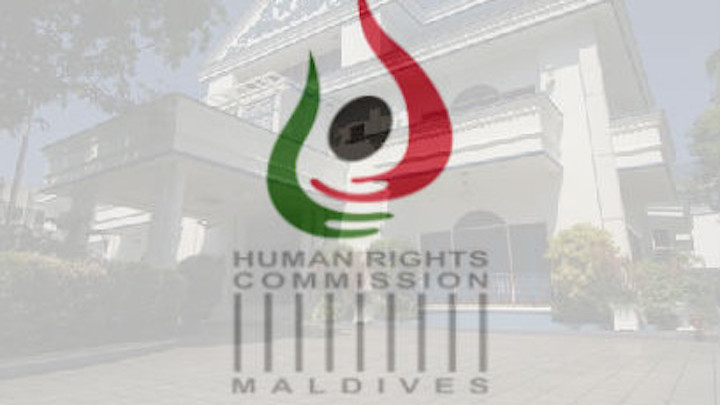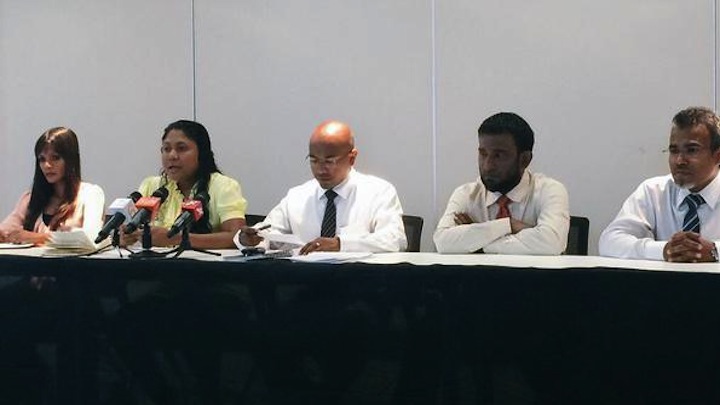The UN Committee on the Elimination of Discrimination against Women has welcomed the Maldives’ progress on protecting women’s rights whilst expressing concern with child marriages, flogging and gender stereotypes in society.
In its concluding observations released last Friday (March 6) on the combined fourth and fifth periodic reports of the Maldives – reviewed at meetings on February 27 with a high-level delegation led by Foreign Minister Dunya Maumoon – the committee welcomed progress achieved since the last review in 2007, including the adoption of a new penal code that includes a definition of rape.
The committee noted other legislative reforms such as the Sexual Harassment and Abuse Prevention Act of 2014, the Sexual Offences Act of 2014, the Prevention of Human Trafficking Act of 2013, the Domestic Violence Prevention Act of 2012, the Employment Act of 2008, and the new Constitution in 2008, “which removes provisions barring women from being elected as President and Vice-President.”
The committee also noted the establishment of the Family Protection Authority in 2012 and welcomed “forthcoming amendments to the Family Act to regulate the distribution of matrimonial assets upon divorce.”
The Maldives acceded to the UN Convention on Elimination of Discrimination against Women (CEDAW) in July 1993 with reservations to article 16, which deals with equality in marriage and family relations.
“We strongly believe that equality of women in all walks of life, within the family, and in public life, is indeed a prerequisite for social justice and inclusive development that benefits all segments of society,” said Foreign Minister Dunya in her opening remarks at the treaty reporting session.
She reiterated the government’s commitment to addressing emerging challenges such as stereotypical practices that hinders equal representation of women in society.
Issues of concern
Whilst welcoming legislative initiatives on improving access to justice, the committee expressed concern with “persistent barriers faced by women in accessing justice”.
Of particular concern was the “insufficient independence of the judiciary, bias and gender stereotypes among judges and law enforcement officials, the absence of gender sensitive procedures and the limited capacity of the police to deal with complaints from women about violations of their rights in a gender-sensitive manner.”
Noting “the high number of unregistered marriages in rural and remote areas, including child marriages,” the committee recommended setting an age limit of 16 for exceptional cases of underage marriages.
The committee also recommended the abolition of flogging for fornication “as a matter of urgency,” noting that flogging “disproportionately affect women and girls and deter them from reporting sexual offences.”
Moreover, the committee noted the “existing discriminatory provisions regarding the participation of women as witnesses and delays in amending the stringent evidentiary provisions required for sexual violence offences.”
The committee noted that marital rape was not criminalised in law, the lack of enforcement of the anti-domestic violence law, and the lack of resources for the Family and Child Service Centres and safe houses.
The committee suggested that social stigma attached to women who report abuse as well as the perception that domestic violence cases were private family matters deters reporting.
Traditional stereotypes regarding the role and responsibilities of women in society meanwhile remain deeply entrenched, the committee observed, “which overemphasise the role of women as wives, mothers and caregivers, as well as prevent them from asserting their rights and actively participating in decision-making and other aspects of political and public life.”
The committee also expressed concern at “the growing trend in conservative interpretations of religion which encourage stereotypical patterns which negatively impact women and girls, as acknowledged by the State party during the dialogue. The Committee is further concerned about the emergence of cases of female genital mutilation in the State party, despite legislative prohibitions.”
Stereotypes as well as geographic constraints also limit girls’ access to higher education, the committee observed, noting “de facto restrictions on the re-entry of pregnant adolescent girls and married girls under the age of 18 in the formal educational system.”
Whilst noting the high representation of women in political parties, the committee noted that “social and cultural barriers continue to stigmatise women wishing to participate in political and public life which prevent them from running for public office.”
The committee noted the underrepresentation of women in parliament, the executive, the judiciary and decision-making level posts in the civil service.
“Further, it regrets the limited participation of women in local governance at community level, in particular in atolls, islands and city councils,” it stated.
On anti-trafficking, the committee expressed concern over “delays in establishing shelters for victims of trafficking and the absence of procedures for early victim identification, case management, and victim protection” and noted the “risk of internal trafficking for women and girls from remote islands placed in households in Male to access higher education opportunities.”
On health issues, the committee noted “limited access to obstetric health services, including pre- and post-natal services, for women living in remote areas,” “restricted access, in practice, to sexual and reproductive health services, for unmarried women and girls,” and “the absence of a study and data on the prevalence of unsafe and illegal abortion which is reportedly increasing.”
Reservations
The committee urged the Maldives to honour its commitment to withdraw its reservation to paragraph two of article 16, which states: “The betrothal and the marriage of a child shall have no legal effect, and all necessary action, including legislation, shall be taken to specify a minimum age for marriage and to make the registration of marriages in an official registry compulsory.”
The committee also recommended a review of the reservation to paragraph one of article 16, “with a view to fully withdrawing it, taking into consideration practices of countries with similar religious backgrounds and legal systems which have successfully harmonised their domestic legislation with international human rights obligations”.
Despite its ratification in 1993, the committee noted that the convention “has yet to be incorporated into its domestic legal system and can therefore not be applied by the courts” and expressed concern with the delay in conducting a gender impact analysis of existing laws.
The committee called on the state to pass gender equality legislation with a definition of discrimination in line with the convention.
Referring to the restructured Ministry of Law and Gender headed by the Attorney General, the committee said the move “weakened [the national machinery’s] institutional capacity to develop coherent and sustainable plans and policies and to ensure effective gender mainstreaming across relevant sectors” and expressed concern about the “the insufficient financial, human and technical resources” available to the ministry.
On the Supreme Court’s suo moto proceedings against members of the Human Rights Commission of Maldives (HRCM) concerning its submission to the UN Human Rights Council’s Universal Period Review last year, the committee said “such actions seriously undermine the independence of the commission.”
Related to this story
Amnesty calls for moratorium on flogging in Maldives
Some police officers believe women to blame for domestic violence, says HRCM
Supreme Court slams HRCM for basing rights assessment on “rejected” UN rapporteur findings
Likes (0)Dislikes
(0)Dislikes (0)
(0)
 (0)Dislikes
(0)Dislikes (0)
(0)

